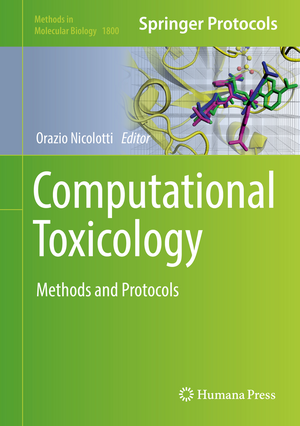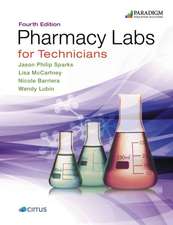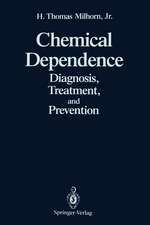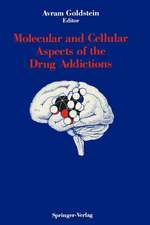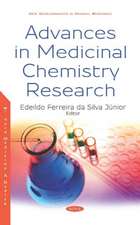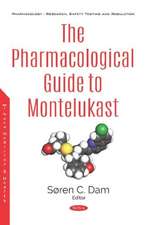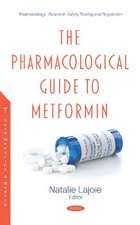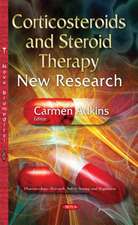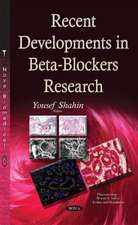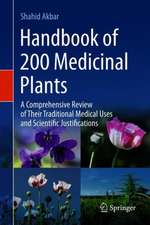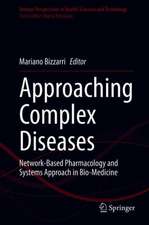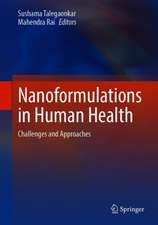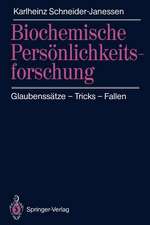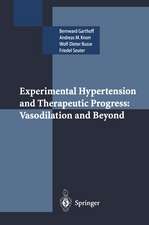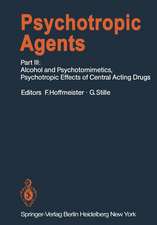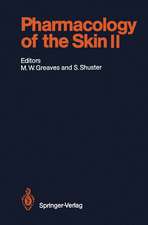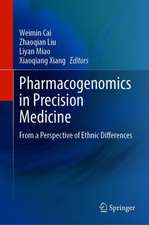Computational Toxicology: Methods and Protocols: Methods in Molecular Biology, cartea 1800
Editat de Orazio Nicolottien Limba Engleză Hardback – 23 iun 2018
This volume explores techniques that are currently used to understand solid target-specific models in computational toxicology. The chapters are divided into four sections and discuss topics such as molecular descriptors, QSAR and read-across; molecular and data modeling techniques to comply with both scientific and regulatory sides; computational toxicology in drug discovery; and strategies on how to predict various human-health toxicology endpoints. Written in the highly successful Methods in Molecular Biology series format, chapters include introductions to their respective topics, lists of the methods and software tools used, step-by-step, readily reproducible computational protocols, and tips on troubleshooting and avoiding known pitfalls.
| Toate formatele și edițiile | Preț | Express |
|---|---|---|
| Paperback (1) | 816.27 lei 38-45 zile | |
| Springer – 10 dec 2019 | 816.27 lei 38-45 zile | |
| Hardback (2) | 1118.02 lei 6-8 săpt. | |
| Springer Us – 21 oct 2024 | 1118.02 lei 6-8 săpt. | |
| Springer – 23 iun 2018 | 1317.33 lei 6-8 săpt. |
Din seria Methods in Molecular Biology
- 9%
 Preț: 791.59 lei
Preț: 791.59 lei - 23%
 Preț: 598.56 lei
Preț: 598.56 lei - 20%
 Preț: 882.95 lei
Preț: 882.95 lei -
 Preț: 252.04 lei
Preț: 252.04 lei - 5%
 Preț: 729.61 lei
Preț: 729.61 lei - 5%
 Preț: 731.43 lei
Preț: 731.43 lei - 5%
 Preț: 741.30 lei
Preț: 741.30 lei - 5%
 Preț: 747.16 lei
Preț: 747.16 lei - 15%
 Preț: 663.45 lei
Preț: 663.45 lei - 18%
 Preț: 1025.34 lei
Preț: 1025.34 lei - 5%
 Preț: 734.57 lei
Preț: 734.57 lei - 18%
 Preț: 914.20 lei
Preț: 914.20 lei - 15%
 Preț: 664.61 lei
Preț: 664.61 lei - 15%
 Preț: 654.12 lei
Preț: 654.12 lei - 18%
 Preț: 1414.74 lei
Preț: 1414.74 lei - 5%
 Preț: 742.60 lei
Preț: 742.60 lei - 20%
 Preț: 821.63 lei
Preț: 821.63 lei - 18%
 Preț: 972.30 lei
Preț: 972.30 lei - 15%
 Preț: 660.49 lei
Preț: 660.49 lei - 5%
 Preț: 738.41 lei
Preț: 738.41 lei - 18%
 Preț: 984.92 lei
Preț: 984.92 lei - 5%
 Preț: 733.29 lei
Preț: 733.29 lei -
 Preț: 392.58 lei
Preț: 392.58 lei - 5%
 Preț: 746.26 lei
Preț: 746.26 lei - 18%
 Preț: 962.66 lei
Preț: 962.66 lei - 23%
 Preț: 860.21 lei
Preț: 860.21 lei - 15%
 Preț: 652.64 lei
Preț: 652.64 lei - 5%
 Preț: 1055.50 lei
Preț: 1055.50 lei - 23%
 Preț: 883.85 lei
Preț: 883.85 lei - 19%
 Preț: 491.88 lei
Preț: 491.88 lei - 5%
 Preț: 1038.84 lei
Preț: 1038.84 lei - 5%
 Preț: 524.15 lei
Preț: 524.15 lei - 18%
 Preț: 2122.34 lei
Preț: 2122.34 lei - 5%
 Preț: 1299.23 lei
Preț: 1299.23 lei - 5%
 Preț: 1339.10 lei
Preț: 1339.10 lei - 18%
 Preț: 1390.26 lei
Preț: 1390.26 lei - 18%
 Preț: 1395.63 lei
Preț: 1395.63 lei - 18%
 Preț: 1129.65 lei
Preț: 1129.65 lei - 18%
 Preț: 1408.26 lei
Preț: 1408.26 lei - 18%
 Preț: 1124.92 lei
Preț: 1124.92 lei - 18%
 Preț: 966.27 lei
Preț: 966.27 lei - 5%
 Preț: 1299.99 lei
Preț: 1299.99 lei - 5%
 Preț: 1108.51 lei
Preț: 1108.51 lei - 5%
 Preț: 983.72 lei
Preț: 983.72 lei - 5%
 Preț: 728.16 lei
Preț: 728.16 lei - 18%
 Preț: 1118.62 lei
Preț: 1118.62 lei - 18%
 Preț: 955.25 lei
Preț: 955.25 lei - 5%
 Preț: 1035.60 lei
Preț: 1035.60 lei - 18%
 Preț: 1400.35 lei
Preț: 1400.35 lei - 20%
 Preț: 817.30 lei
Preț: 817.30 lei
Preț: 1317.33 lei
Preț vechi: 1386.66 lei
-5% Nou
Puncte Express: 1976
Preț estimativ în valută:
252.14€ • 262.23$ • 211.29£
252.14€ • 262.23$ • 211.29£
Carte tipărită la comandă
Livrare economică 14-28 martie
Preluare comenzi: 021 569.72.76
Specificații
ISBN-13: 9781493978984
ISBN-10: 1493978985
Pagini: 650
Ilustrații: XVI, 587 p. 177 illus., 115 illus. in color.
Dimensiuni: 178 x 254 x 41 mm
Greutate: 1.26 kg
Ediția:1st ed. 2018
Editura: Springer
Colecția Humana
Seria Methods in Molecular Biology
Locul publicării:New York, NY, United States
ISBN-10: 1493978985
Pagini: 650
Ilustrații: XVI, 587 p. 177 illus., 115 illus. in color.
Dimensiuni: 178 x 254 x 41 mm
Greutate: 1.26 kg
Ediția:1st ed. 2018
Editura: Springer
Colecția Humana
Seria Methods in Molecular Biology
Locul publicării:New York, NY, United States
Cuprins
Molecular Descriptors For Structure-Activity Applications: A Hands-On Approach.- The OECD QSAR Toolbox Starts Its Second Decade.- QSAR: What Else? .- (Q)SARs as Adaptations to REACH Information Requirements.- Machine Learning Methods In Computational Toxicology.- Applicability Domain: A Step Toward Confident Predictions And Decidability for QSAR Modeling.- Molecular Similarity In Computational Toxicology.- Molecular Docking for Predictive Toxicology.- Criteria and Application on the use of Non-Testing Methods within a Weight of Evidence Strategy.- Characterization and Management of Uncertainties in Toxicological Risk Assessment: Examples from the Opinions of the European Food Safety Authority.- Computational Toxicology and Drug Discovery.- Approaching Pharmacological Space: Events and Components.- Computational Toxicology Methods in Chemical Library Design and High-Throughput Screening Hit Validation.- Enalos Suite:New Cheminformatics Platform for Drug Discovery and Computational Toxicology.- Ion Channels In Drug Discovery and Safety Pharmacology.- Computational Approaches in Multi-Target Drug Discovery.- Nano-Formulations for Drug Delivery: Safety, Toxicity, and Efficacy.- Toxicity Potential Of Nutraceuticals.- Impact of Pharmaceuticals on the Environment: Risk Assessment using QSAR Modeling Approach.- (Q)SAR Methods for Predicting Genotoxicity and Carcinogenicity: Scientific Rationale and Regulatory Frameworks.- Stem Cell-Based Methods to Predict Developmental Chemical Toxicity.- Predicting Chemically-Induced Skin Sensitisation by using In Chemico/In Vitro Methods.- Hepatotoxicity Prediction by Systems Biology Modeling of Disturbed Metabolic Pathways using Gene Expression Data.- Non-Test Methods to Predict Acute Toxicity: State of Art for Applications of In Silico Methods.- Predictive Systems Toxicology.- Chemoinformatic Approach to Assess Toxicity of Ionic Liquids.- Prediction of Biochemical Endpoints by the CORAL Software: Prejudices, Paradoxes, and Results.
Textul de pe ultima copertă
This volume explores techniques that are currently used to understand solid target-specific models in computational toxicology. The chapters are divided into four sections and discuss topics such as molecular descriptors, QSAR and read-across; molecular and data modeling techniques to comply both with scientific and regulatory sides; computational toxicology in drug discovery; and strategies on how to predict various human-health toxicology endpoints. Written in the highly successful Methods in Molecular Biology series format, chapters include introductions to their respective topics, lists of the methods and software tools used, step-by-step, readily reproducible computational protocols, and tips on troubleshooting and avoiding known pitfalls.
Caracteristici
Includes cutting-edge methods and protocols Provides step-by-step detail essential for reproducible results Contains key notes and implementation advice from the experts
